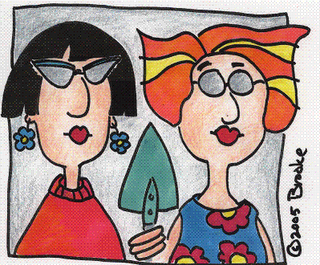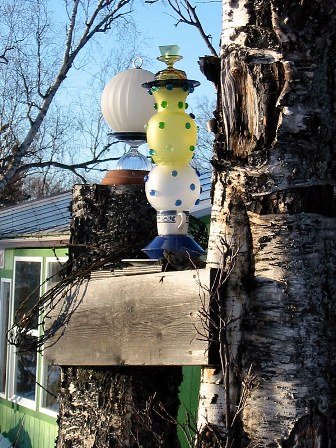
I think the official color for May ought to be taupe. You know, that almost brown, sort of dusty ‘blandscape’ overlaid with chilly gray overcast skies. This isn’t exactly the sort of weather and tone that makes me want to even think about gardening. But, you can already hear the low buzz of the early prowling lawn mowers and the dull whining of from folks complaining about their neighbor’s lawn care; a sure sign of spring. The North American lawn could be one of the most successful behavioral controls ever invented. Think about it. Lawns and turf take up over 30 million acres of land making it the fifth largest crop in North America. There are approximately 38 million lawn mowers dragging North American slaves behind them all summer long. Maybe it’s time to think about freeing our selves and our property from the insidious and destructive institution of sod!
Think about it. Between 1996 and 2004 more than 663,000 of us were treated for lawn mower related injuries in hospital emergency rooms. That’s about 2 out of every 1000 injuries in the ER! Many of those injured are under the age of fifteen or over the age of 60. But, the lawn mower itself isn’t as dangerous as the lawn owner. Americans apply pesticides, fertilizers, and herbicides to their lawns at about four times the rate as applied to agricultural crops. According to the US National Cancer Institute the incidence of childhood leukemia is approximately 6 ½ times greater among families using lawn pesticides than for those who do not.
Fertilizers and lime are applied religiously by homeowners who rarely, if ever, have their soils tested to see if they are even necessary. Many of the chemicals applied to our gardens and lawns find their way into our water supply. A 1990 EPA survey found that 12 of 32 untested pesticides and herbicides made it to their water testing sites. We spill nearly 15 million gallons of gasoline a year while filling these slave masters. Yale forest ecologist, F. Herbert Bormann estimates that we burn about 580 million gallons of gas mowing the lawn annually while polluting the air in one hour as much as driving our cars 350 miles!
Think about it. In the American west approximately 60 % of urban fresh water is used to irrigate our lawns. It takes a lot of energy to maintain water quality, run the wells, pumps, an the water stations just to keep junior in the shower for an hour, let alone to water the lawn! And we’re doing all of this why? Because we’ve bought into the idea that a green lawn and lots of it keeps nature at bay, is an important asset in a neighborhood, and our neighbors expect us to toe the line. In fact, in some places it’s the law that you only have lawn in your front yard. Maybe lawns are just too dangerous and expensive to consider as an asset anymore. You can’t eat your lawn, it’s hard on the environment, and takes a lot of money and work to maintain. So, if you wanted to work hard on your yard wouldn’t you want to work at something with more bang for your buck?
Why not cover some of that lawn with some raised beds filled with exotic herbs and vegetables? You could learn how to grow and cook your own delicious meals. You don’t need lots of lawn for a great garden party, but, you do need good food. Replace that blandscape with flowering kale, colorful varieties of loose leafed lettuces, golden zucchini, rainbow colored chard, lemon thyme, sweet marjoram, and lots of nasturtiums. Wouldn’t you rather spend time with your spouse sitting on the bed doing a little weeding and discussing some exciting new recipes you both want to try? Take a cooking class and renew your relationship with your garden and your former lawn slave!
Try using the lawn as an accent to borders of perennials and shrubs and you’ll have a ready source of material for floral arrangements that will make you the envy of your friends. Children will have more fun hiding around large planted beds than pushing the lawn mower. Pets can be compatible with plantings if you don’t stress out over every little accident. Gardens should be relaxing and enjoyed, not as places to shackle ourselves to expectations of others. That’s what lawns are for. Think about it!



1 comment:
I've thought about it and I agree. My lawn (such as it is) gets smaller every year.
Post a Comment